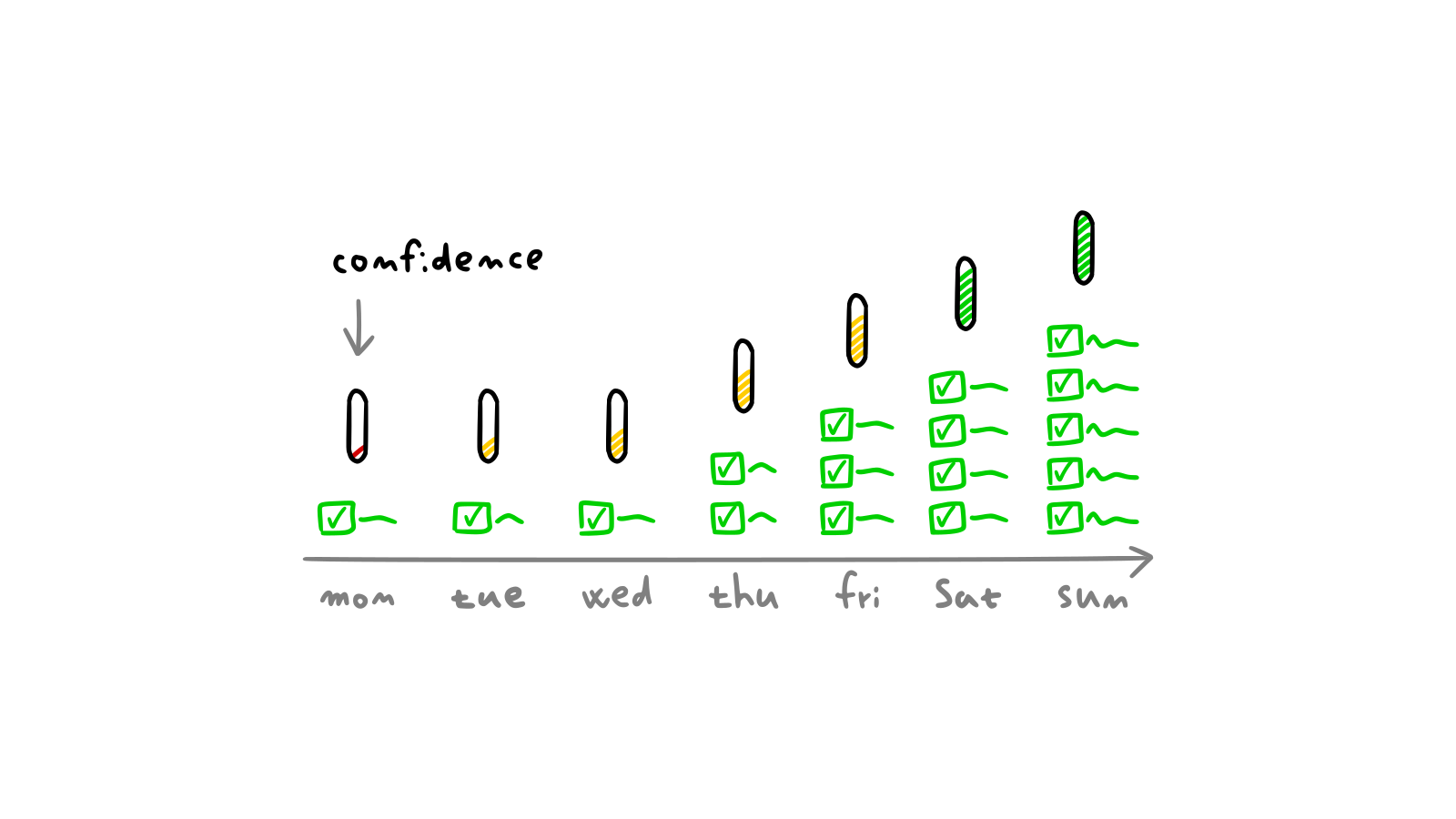How to make New Year's resolutions work for you

Most New Year's resolutions fail. To be precise, it’s around 80%. [1]
Why do people still repeat something that mostly doesn’t work?
Because people love the concept of a fresh start.
From a certain date, I’ll change my life, I’ll lose weight, start a business, I’ll be perfect.
Can you hear the hope in this?
Even if we’re unsatisfied with the current state of things, we can see our future brighter.
Even if we’re procrastinating and currently watching videos instead of work, we can feel somehow good about ourselves because we’re planning to stop doing this after a certain date.
The problem with resolutions is that we overestimate our abilities, energy, and time available in the future.
We think that in the future we'll have much more time than right now. We make this mistake because we think about our future plans only in vague and unclear terms, but we’ll probably be just as busy as we are now.
The future is fuzzy in comparison to the grim reality of sitting down right now and doing the work.
Additionally, we also think that our willpower will be much stronger than now. We think we won’t give up this time. It will be different.
This lets us get away with being lazy now and not trying. We basically throw all the effort on our future selves. However, when the date arrives and it’s time to change, most of us can’t do it. We borrow from our future selves that have to pay the interest.
Even if the previous paragraphs might sound discouraging, we still think that New Year’s resolutions can work.
Drawing a thick line behind your past can be immensely helpful in changing yourself.
However, you need to think about New Year’s resolutions differently.
How to make New Year’s resolutions work
1. Don’t say what the hell
As we’ve covered here, when people screw up something (like their diet) they say what the hell and binge eat everything.
This is the common reason why New Year’s resolutions fail. Once people fail at doing their new chosen behavior, they start thinking that it doesn’t matter now, and stop trying (or resume their bad habits again).
For example, people create a complicated “perfect” morning routine: Wake up at 6 am, do yoga for 15 minutes, write in a diary, take a cold shower... A few days in, they don’t wake up on time and they say: I failed to wake up on time, my routine can’t be perfect anymore, and they don’t do anything else. But it doesn’t have to be that way.
Let’s say you decide you finally want to start publishing your blog posts and you commit to writing for 30 minutes every day. You’re two weeks in and you forgot to write yesterday. Most people will be really mad about not writing yesterday and many will say: I screwed up, I didn’t follow the plan, and then they don’t write that day or the next day, and then stop writing altogether.
However, you don’t need to be perfect. That wasn’t the goal. The goal was to publish on your blog. You can still do that. Missing one day doesn’t mean anything in the long run.
If you fail, forgive yourself and instead of saying what the hell, resume right now or the next day.
At this point in time, you might also not feel like you want to get after the original goal anymore. In this case, examine why you wanted to achieve the goal in the first place. Weak or impersonal reasons often lead to abandoning it rather quickly.
That’s why you should only choose to change the most painful things or pursue the things you want the most. Reasons like I heard it’s good for my career, my family wants me to do it, or it’s good to know multiple languages won’t cut it. Your reasons for changing should be strong and personal.
When you have strong reasons for why you wanted to change, you realize that doing anything at all is better than doing nothing. You understand that you don’t have to say what the hell because the goal wasn’t to be perfect, but better.
2. Expect that difficult times will come
As we’ve covered in How to change yourself, the first wave of inspiration and motivation runs out eventually. This is when the real progress happens.
In the beginning, when everything is going great, we start wearing rose tinted glasses that make us overestimate our ability to control and change ourselves.
We think that we know it all.
The bad news is that after the first thrill runs out (usually takes a week or two), it gets more difficult. This is also when most people fail.
When it gets more difficult, that’s when you need to use your discipline to stick through with the behavior.
We tell you this not to discourage you, but to help you stay realistic. When you know that there will be some hard days, you won’t be surprised. You can prepare how you’ll handle this. Many people quit because they think everything will go smoothly and then they hit an obstacle and bail.
The good news is, if you stick with your new behavior for 3-4 weeks, it will become significantly easier later on.
Expect that you’ll need to use your willpower to act despite not feeling motivated.
3. Mindset shift: Start thinking about helping your future self
When the difficult times come, we often get into a mindset of despising the endeavors we’ve decided to pursue. We feel like we have to do them and we don’t want to. We would rather do something easy like watching Netflix, playing video games, or checking social media.
You already know that you should remind yourself why you wanted to make a change in the first place. However, sometimes even this doesn’t help. Certain activities that are beneficial for you in the long term don’t feel great in the moment.
There is a simple mindset shift that can make hard things easier to do: You’re helping your future self.
When you start thinking about helping your future self, instead of thinking about just suffering now with no payoff, everything gets easier.
Think about it in this way: Whenever you procrastinate, you make things harder for your future self. There isn’t a way to escape responsibilities forever. On the other hand, if you start working consistently, you make it easier for your future self. Additionally, your future self will eventually become your present self. It’s still you after all.
You are the result of the choices your past self made for you.
Eating healthy so you’re not fat? Thank your past self for that.
Learned a valuable skill and can get a job easily? Thanks, past me, I can buy nice things.
Finished a task ahead of deadline? Great, I can now enjoy free time.
Next time, you feel like you don’t feel like working, remind yourself that every task you do successfully will help your future self. And when you get to that point in the future, you'll feel proud of the choices you made.
4. Become accountable to someone
One of the easiest ways to stick with a behavior is by becoming accountable to someone else.
We think we can hold ourselves accountable, but that often fails in reality. We’re great at coming up with rationalizations for why we ate that cake, skipped that workout, or checked social media in the middle of our workday.
I didn’t do it because ____________. We can always come up with good reasons for why we didn’t do something. We do this to protect our conscience because we don’t like to face the truth.
When you become accountable to someone else, however, rationalizations become way more difficult. The other person can easily tell whether you’re bullsh*ting or not.
Here are some ways to use accountability to your advantage.
1. Take on a new habit with a friend
One frequent use of this is the "gym buddy system." It can be hard to get ourselves to do a hard activity like working out, and commit to it.
However, if we make a pact with a friend to show up every Monday, Wednesday, and Friday after work and do a workout, we add a bit of extra pressure that helps us actually show up. We don't want to disappoint our friend, do we?
Do you have a friend who wants to do something you also want to do? Working out, journalling, studying...?
Make an agreement, set a time, and hold each other accountable!
2. Make a bet
Another way to motivate yourself can be making a bet.
You can also do this with friends or you can use a service like StickKor Beeminder.com.
Both services allow you to place a financial bet - if I don't do X, I will lose X money.
Beeminder gets data from a variety of sources - you can set a goal of writing a certain number of words every day or running X miles and connect it to Google docs or Strava, and if you don't honor your commitment, you'll lose money.
Sometimes pressure is productive. Want to heighten the stakes? Make a bet.
Summary
Here's how to make New Year's resolutions actually work:
Don't say what the hell
Expect that difficult will come
Mindset shift: Start thinking about your future self
Become accountable to someone
- Take on a new habit with a friend
- Make a bet
If you promise yourself that you'll change, make sure you set yourself up to win, not fail.



